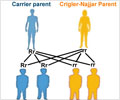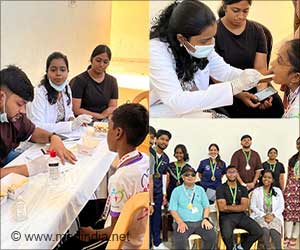Liver transplant recipients develop premature immune senescence, the normal process by which the immune system ages and becomes less effective, researchers at the University of Cambridge have found.
Full details appear in the May issue of Liver Transplantation, a journal published by Wiley-Blackwell on behalf of the American Association for the Study of Liver Diseases (AASLD).The University of Cambridge research team investigated whether the chronic immune stress of liver disease and organ transplantation accelerates aging of the immune system, which in turn contributes to excess morbidity and mortality in established liver graft recipients. Study leader Dr. Graeme Alexander explains, "There is a marked increase in the prevalence of cardiac disease, malignancy, cerebrovascular disease and infections in patients with established liver grafts, affecting a majority of cases eventually and which in the past have been attributed to agents used to suppress immune responses. However, an alternative (and not exclusive) hypothesis is that liver transplant recipients develop premature immune senescence which is also associated with these same pathologies, perhaps consequent to chronic alloantigenic stimulation."
The study participants included 97 liver transplant recipients with established grafts (at least 3 years) and 41 age and sex-matched controls. When cases were compared with controls for each marker of immune senescence, the researchers discovered that liver graft recipients had shorter T-cell telomeres and more cells of a mature phenotype than healthy age-matched controls. Telomeres are chromosomal structures that shorten each time a cell divides. Scientists theorize that telomeres eventually become so short that they stop functioning, which causes the cell to stop proliferating. T-cells are lymphocytes, major players of the immune system. With age, these cells become less active, making the body more vulnerable. These cells are the focus of much research on the aging immune system.
Dr. Alexander summarizes the study analysis, stating, "Liver transplant recipients with established allografts had shorter lymphocyte telomeres when compared with the healthy control group with similar demographics. Lymphocyte telomere length was similar in liver transplant recipients and healthy controls when analysis was restricted to aged lymphocytes. In addition to having lymphocytes with shorter telomeres, liver transplant recipients also had more mature CD4+ T-cells and fewer immature CD4+ and CD8+ T- cells. Taken together, these observations suggest first, that liver transplant recipients with established grafts have fewer immature lymphocytes and second, that their immature lymphocytes are more aged than healthy controls."
In an editorial in this month's issue of Liver Transplantation, Dr. Janet Lord from the University of Birmingham in the U.K. comments on the Cambridge team's findings: "The important question arising from these data is whether the T-cell immune senescence seen in the established graft patients, equivalent to adding only 1 extra year to T-cell "age," is enough to impact on morbidity and mortality. Longitudinal studies will be required to determine if the T-cells in the graft recipients continue to age at an accelerated rate, as suggested by the data of Alexander et al and if this associated with increased incidence of malignancy and infections...If accelerated T-cell immune senescence does indeed reflect chronic activation of the adaptive immune system, then shortened telomeres or increased markers of T-cell maturation may represent good indicators of patients likely to develop more post-graft complications. As graft recipients are now surviving much longer, we can anticipate that such prognostic indicators will be useful in the long-term management of these patients."
Advertisement
RAS















